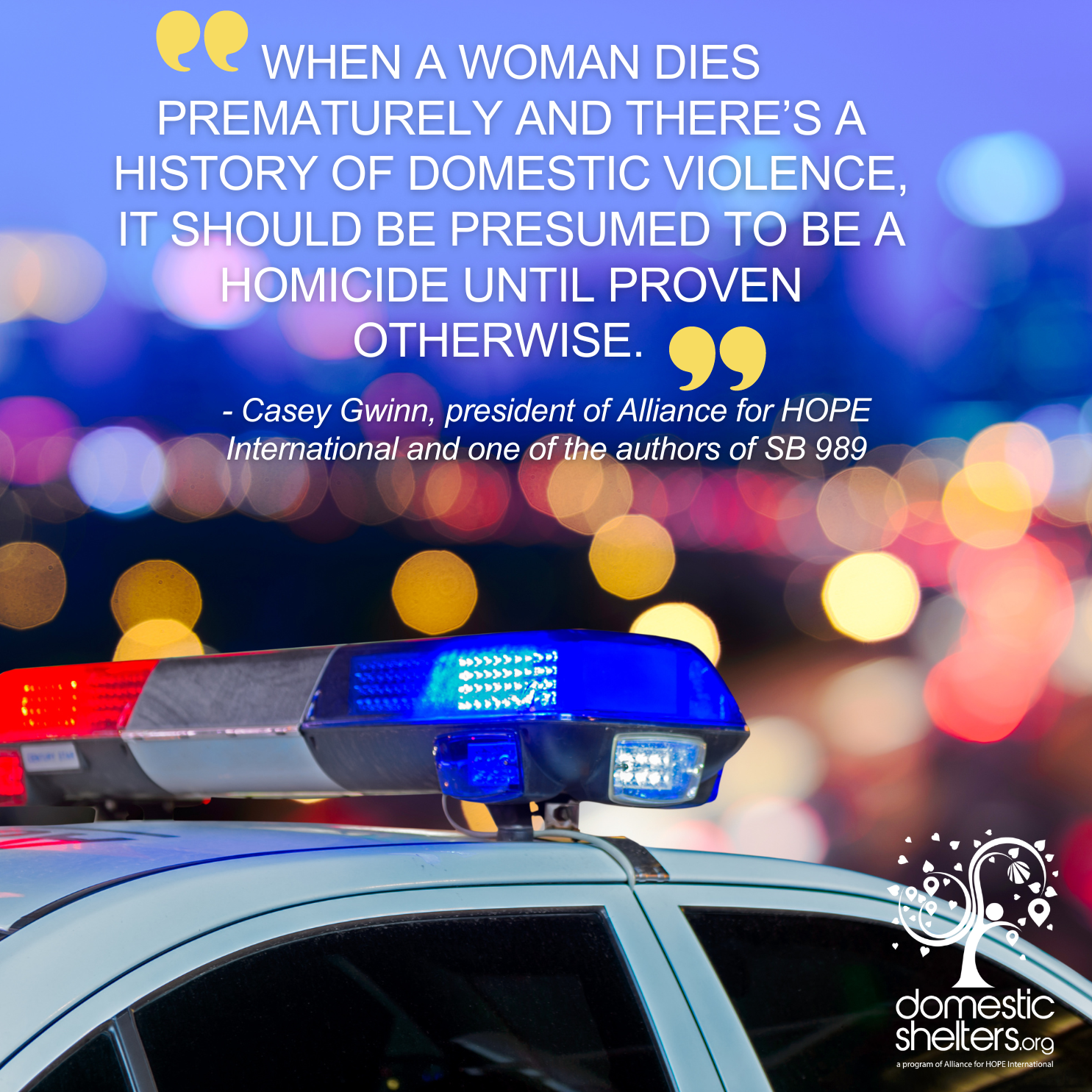1. Select a discrete app icon.

notes
Hidden Homicides Bill Addresses Abusers Who Cover Up Murder
Named in honor of Joanna Hunter, whose family say didn’t die by suicide
- Jul 09, 2024

There are a multitude of abusive partners getting away with murder, and those closest to these domestic violence victims know it.
A new bill in California would address the issue of what are known as “hidden homicides” —those deaths that appear on the surface to be accidental or suicidal, but which may actually be murder by an abusive partner.
This May, the California State Senate voted unanimously in support of SB 989, also known as the “Suspicious Death Bill” or “Joanna’s Law.” SB 989 was named in honor and memory of Joanna Hunter who died in 2011 in Solano County, Calif. Her death was ruled a suicide without, say family members, an adequate investigation into the previous history of domestic abuse by her husband.
The bill, authored by Senators Angelique Ashby and Susan Rubio, researched by Gael Strack of Alliance for HOPE International, and written by Casey Gwinn, president of the Alliance, will now advance to the Assembly for a vote. If passed, it will allow families to request additional scrutiny of death cases that they believe are suspicious after a history of domestic violence.
SB 989 would also allow family members of the victim a right to obtain death records when there is a history of domestic violence and to request special consideration from medical examiners and coroners before a determination of a suicide or accidental death.
“When a woman dies prematurely and there’s a history of domestic violence, it should be presumed to be a homicide until proven otherwise,” says Gwinn.
Did Joanna Take Her Own Life or Was She Murdered?
Joanna Hunter had tried to leave her husband, Mark Lewis, multiple times before her death, often seeking refuge at her parents’ house just a short distance away. In response, Patricia Hunter, Joanna’s mom, says Lewis would respond with violence.

“He would call constantly and hang up during the night. He slashed her tires. He threw a rock through our window.”
But each time, his constant coercion forced Joanna to go back. It broke Patricia’s heart.
“The year before she died, she called me and said, ‘Mom, come get me.’” Patricia didn’t hesitate. She and her husband lived only a few blocks away from their daughter.
“She was walking down the street toward our house. She got in the car and I said, ‘Are you alright?’ She said, ‘Mom I’m stronger than I’ve ever been, and I want to come home.’”
Patricia said Lewis’ abuse started as soon as the two had met in high school. She had tried to get her daughter away from him then, but to no avail. Joanna was deeply spiritual, and Lewis had been “born again” after a jail stint for physically assaulting and strangling Joanna. He became a pastor in his father’s church in Vacaville, Calif., and Joanna and Lewis soon married. Patricia found out after the fact and confronted her son-in-law. She told him she couldn’t trust him not to hurt her daughter. She says Lewis replied, “When Joanna’s a better wife and better Christian you won’t have to worry about it.”
“Joanna had a hard time getting out because of the message that this is what a good woman does,” Patricia said.
This last time, Joanna stayed a week before telling her mom, I have to go back. Joanna told her mom that Lewis had “done something so bad that if church members find out about it, he won’t be pastor anymore.”
“If you want to support him, support him from our house,” Patricia replied, but Joanna insisted she return. She’d even walk home if she had to.
So once again, Patricia got in her car and drove her daughter back. Patricia was crying so hard on the way, she said, she had to pull the car over.
“I remember looking at [Joanna] and saying, ‘I’m worried if I take you back to him I’ll never see you again.’”
On Oct. 7, 2011, Patricia was preparing to teach a class when the office called and said a friend of Lewis’ wanted to come talk to her. Patricia stepped out of her classroom, thinking Joanna had sent the man to tell her that she wanted her mom to come get her.
Instead, “He said, ‘Joanna’s dead,’ and I pushed him and yelled, ‘You’re lying,’” remembers Patricia. Her daughter, 36 years old, had been found dead the day before. Patricia was just hearing about it, and not from police. Patricia was outraged. She grabbed him by the shirt and screamed at him: “WHAT DID HE DO?”

As soon as Patricia got home, friends and family called the Solano County Sheriff's Office and, to their horror, found there was no investigation in progress. No autopsy would even be conducted. Patricia’s daughter, they determined, had killed herself. She had been found hanging from a bathrobe belt in a closet in their home. A note nearby said, “Take care of the dogs,” a message Patricia knew wasn’t her daughter’s last words, but rather, instructions for her husband before Joanna left him.
“There was an open suitcase next to her,” Patricia says, a fact she’d learn about only later. “We believe she was coming home. On her last stay at home, she asked if she could bring the dogs but with her dad’s asthma, it seemed doubtful. Nothing we said to the sheriff over the phone mattered. They never came to see us or asked us about the history of domestic violence. They had made their assumptions and were standing by them.”
Lewis Moves on to the Next
Within 24 hours of his wife’s death, Sarah Nottingham told ABC News that she received a call from Lewis. A member of his church and Sunday school teacher, Nottingham says she and Lewis quickly began a secretive affair. It lasted until Nottingham discovered Lewis was texting inappropriate things to other women at his church, including 17-year-old Desiree Nye, who had been a member of the church since age five. Nye told ABC’s 20/20 that she had always looked at Lewis like a dad.
“And then, I was more confused because then he would send me something ... inappropriate ... like a picture of him with nothing on,” says Nye.
After Nottingham ended things for good, Lewis began to stalk her, smashing her car window, allegedly setting a bush on fire outside her house, all of which he denied. But the final straw was a Molotov cocktail thrown through Nottingham’s widow. Luckily, she survived unscathed—the attack left only her window blinds burned. For this, Lewis was arrested and was charged in 2015 with arson and stalking. Lewis, 40 at the time, was sentenced to eight years in prison.
While she was never given any official word that he was out, Patricia says she believes he has since been released and is living in Ohio where his father is still a pastor. The Solano County Sheriff’s Office reopened Joanna’s case after what happened to Nottingham, though no determinations have yet been released.
The 10 Signs of a Hidden Domestic Violence Homicide
Alliance for HOPE International, through their Justice Project program, independently reviews hidden homicide cases around the country at the request of family members. Joanna’s case became one of them after the Sacramento Regional Family Justice Center reached out on Patricia’s behalf for help.
Gwinn says he and Strack believe there could be at least 1,000 hidden homicide cases in the U.S. each year.
“The challenge that we have is that no one wants to admit that the murder rate of women might be double the reported rate,” he says. “If we’re right about Mark Lewis, he not only killed one woman but tried to kill another.”
Strack says the goal is to sound an alarm bell that this is an ongoing problem across the country.
“If we can raise awareness about suspicious death cases, potential killers will think twice about it because they’ll be a lot less likely to get away with murder.”
SB 989 will put the 10 factors of hidden homicides that Gwinn and Strack have found in published research on staged crime scenes into state law. When any of those factors exist, the death will be deemed suspicious and the medical examiner will be directed to take another look. They include:
- The person died prematurely or in an untimely manner.
- The scene of the death gives the appearance of death due to suicide or accident.
- One partner wanted to end the relationship.
- There is a history of being victimized by domestic violence that includes coercive control.
- The person is found dead in a home or place of residence.
- The person is found by a current or previous partner.
- There is a history of being victimized by domestic violence that includes strangulation or suffocation.
- The current or previous partner of the person who has died, or child of the person who died or the person’s current or previous partner, is the last to see the person alive.
- The partner had control of the scene before law enforcement arrived.
- The body of the person has been moved or the scene or other evidence is altered in some way.
Gwinn and Strack want SB 989, once passed in California, to become a model statute they can then advocate for in every state in the country. Joanna’s brother Joseph, a Captain with the Sacramento Fire Department, says first responders all need to know the ten factors to be evaluated in a suspicious death case. “With SB 989, we can prevent killers from getting away with murder.”
Patricia says that if SB 989 passes, it will honor Joanna’s life in a way that she deserves to be honored. Patricia has attended every hearing on the bill since it was first introduced. She takes a picture of Joanna with her to every hearing.
“She always loved to help people. That was huge in her life. To have [the bill] tell her story and to have it help another family find justice, to save further victims of domestic violence, it would be so empowering. It would be like saying, ‘This is what happened to me, to Joanna, this is my voice.’”
Donate and change a life
Your support gives hope and help to victims of domestic violence every day.







